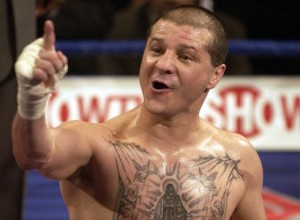Johnny Tapia dies at 45
Former three-weight world boxing champion Johnny Tapia has died at the age of 45.
Tapia’s body was found in his Albuquerque, New Mexico, home on Sunday night and police spokesperson Robert Gibbs said there did not appear to be any suspicious circumstances.
Although a highly successful boxer, Tapia’s life outside the ring was highly tumultuous: plagued by drug use, depression and brushes with the law.
His mother was murdered when he was eight, and his father was reportedly killed before the boxer was born.
He had the Spanish phrase “mi vida loca” (my crazy life) tattooed on his stomach and went after his opponents in an all-action style.
Tapia turned professional in 1988 and after going unbeaten in his first 48 fights – claiming the WBO and IBF super flyweight titles plus the WBA bantamweight crown in the process – he was eventually defeated by Paulie Ayala in June 1999.
He won the IBF featherweight title in April 2002 with a majority decision victory over Manuel Medina but dropped a decision to Marco Antonio Barrera six months later and from there his career went slowly downhill.
His last fight came in June 2011 when he scored an eight-round decision over Mauricio Pastrana in his home town of Albuquerque. Leaving him with a career record of 59 wins, five losses and two draws.
Tapia was a huge fan favourite after overcoming the most horrific of tragedies: his father was murdered while his mother was still pregnant with him, at the age of seven he survived a horrendous crash when a bus he was in careered off a 100ft cliff. And worst of all, a year later his mother was raped, tortured and murdered.
Dedicating himself to boxing from the age of nine, he quickly shone and enjoyed a stellar amateur career before turning professional in 1988. Two years later he was unbeaten and seemed set for the top of the sport, but he was suspended for three and a half years after testing positive for cocaine.
He returned to the ring in 1994 and soon won his first world title, the WBO super flyweight crown, and added the IBF version of the title three years later before moving up to bantamweight and become WBA champion in 1998.
A year later he lost the first bout of his professional career against Paulie Ayala, and was so devastated that he tried to commit suicide with a drug overdose. He survived, in the process recording the first of five times that survived after being pronounced clinically dead.
In 1999, however, he returned to the ring to become WBO bantamweight champion, before going up another weight category and collecting the WBC and IBF featherweight titles before eventually losing his titles to Marco Antonio Barrera in 2002.
In 2007 he announced he would fight one more time before retiring, but after narrowly losing a split decision he almost died after a cocaine overdose.
Tragedy still refused to stop following him, however – his brother-in-law and nephew were killed in a car crash as they were on their way to visit him as he recovered in hospital.
Tapia continued to struggle with drug addiction, and spent time in prison on several occasions, including once when he violated his parole by helping his family to search for a missing cousin. The cousin was found dead four days later.
His last spell in jail came after he failed a drug test in 2010 but once again he returned to the ring, earning three more victories to end his career with 59 wins, five defeats and two draws in one of the most extraordinary sporting lives of all time.
Although a highly successful boxer, his career was marked by cocaine addiction, alcohol, depression and run-ins with the law. He had several stints in jail.
In his 2010 autobiography – “Mi Vida Loca,” (My Crazy Life) he explained how his father had been murdered before he was born. How his mother was raped, stabbed to death in front of him with a screwdriver when he was eight years old. Tapia himself, addicted to cocaine, saw friends murdered.
In the ring, he was calmness itself. Boxing was his escape. Tapia was frequently in recent years working in the press rooms at big fights, walking with a camera crew and doing vox pop interviews.
I did several of them with him. There was a huge warmth towards him from all those within boxing. In every way he was a credit to the sport, because it had in fact kept him alive. He was simply a great character, yet the workings of his life were brutal, complex and he was unluckily shaped by the destruction around him early in his life.
The gym was his refuge. But outside that, his life was chaos. He was declared dead four times, after overdosing on drugs, mainly cocaine.
In a boxing career spanning over two decades, he finished with a record of 59-5-2 with 30 knockouts. He fought the last of them in June 2011.
He was knocked down just twice in his career. One of those occasions being in his fight. He outpointed Mauricio Pastrana in an eight-round decision last June, having got up off the canvas to win the fight.
He had done so many times, metaphorically, in his life. He was funny, gifted and will be missed by the boxing world.
Tapia won five championships in three weight classes, winning the WBA bantamweight title, the IBF and WBO junior bantamweight titles and the IBF featherweight belt.
